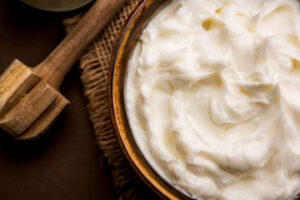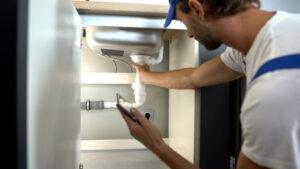A richer, thicker alternative to body lotion, body butter nourishes and deeply moisturizes skin. They’re great for people prone to dryness and are especially good for sensitive areas like knees, elbows, and hands.

Made with shea and jojoba oil, this creamy body butter by Kiehl’s is dermatologist-tested for chronically dry skin. Try whipped argan oil Body Butter for intensely hydrating the skin.
Body butter is a thick moisturizer that helps to nourish and lock in moisture on your skin. It is a great product for people with dry or itchy skin and can help to heal damaged areas. It is made from a combination of natural ingredients that help to deeply moisturize the skin and can also contain essential oils that provide a pleasant scent. You can apply body butter to your skin all over, or focus on problem areas like the elbows, knees, and feet. It is important to use the right amount of body butter, as over-applying can cause a greasy residue.
It is best to use body butter after a shower or bath when the skin is slightly damp. This will help the body butter to absorb better and avoid a greasy residue. If you have itchy or sensitive skin, you may want to use a gentle body wash before applying the body butter to avoid irritation. It is also important to store body butter in a cool place because it can melt in hot temperatures.
Using body butter can be beneficial for all skin types, but it is especially good for those with dry and itchy skin. It can also help to reduce the appearance of stretch marks, which is a common concern for women during pregnancy. It is also a great product for reducing the appearance of scars, as it can promote skin healing and repair.
To use body butter, first gently massage it into your skin with your fingers. It can be a little bit tricky to get the hang of, as it is not the same consistency as your regular lotions and creams. You can try to scoop out a small portion and warm it between your hands to make it easier to spread.
If you have extremely dry and itchy skin, you may want to use a heavier body butter, such as a shea or cocoa butter. These can be a bit harder to work with, but they will give you the most intense hydration. If you have a lot of dry skin on your feet, you can use a thick body butter on them and then put on a pair of cotton socks or gloves before going to sleep. This will allow the body butter to soak in overnight and help to heal your feet.
Precautions
Body butter is a skin moisturizer that typically contains shea butter, coconut oil and/or other vegetable-based oils and butters. They are known to be thicker than regular body lotion and moisturisers and therefore require more time to absorb into the skin. Body Butters usually come in a jar or similar container so that you can scoop the desired amount of product. They can be stored in the fridge or somewhere that isn’t very humid but they should never be placed directly into sunlight as this will cause them to melt.
If you choose to purchase a pre-made Body Butter, always be sure that the ingredient list is clean. Some companies add extra ingredients into their Body Butters that may cause a sensitivity or allergic reaction for some people. If you are unsure of what kind of ingredients to look for, it is best to consult with a dermatologist before trying new products.
You should always patch test any new products on a small area of your skin to see how it reacts. Even if the product is labeled as skin-friendly and non-comedogenic, everyone’s skin is different. What might be good for one person, could cause a rash or clogged pores in another.
In addition, the natural butters that are used to create Body Butters are often derived from nuts or seeds/kernels and some individuals might be sensitive to these ingredients. You should also avoid using body butters on any areas of your skin that are bleeding or irritated.
It is recommended to use Body Butter once you’ve had your daily shower or bath and have patted your body dry with a towel. The natural oils from your skin and the body butter will combine to create a luxurious moisture that is absorbed deep into your skin.
If you want to take it a step further, try applying the body butter right before you go to bed. This way, it will have plenty of time to penetrate your skin fully and give you a hydration boost throughout the night. You can also apply it to your hands or feet for superior hydration.
Side Effects
Body butter is a richer type of skin moisturizer than lotion. It is typically a thick cream that contains natural butters, such as mango or shea butter, and oil, such as shea, olive, or jojoba oil. It is usually scented with essential oils, which add a pleasant fragrance. This deep hydration helps protect the skin and combat dryness, itchiness, flakiness, wrinkles, and sagging. It can also help minimize stretch marks and enhance skin elasticity. Some formulations also contain emollients, which soften the skin and add moisture.
Body butters are a great way to pamper the skin and provide a luxurious experience. They are best used on freshly-showered or bathed skin, when the pores are more open and can absorb more of the product. They can be applied to the entire body or just specific problem areas, such as elbows, knees, feet, and other rough spots.
However, some people may be sensitive to the ingredients in body butters. These can cause side effects, such as clogged pores, itching, and irritation. It is important to patch-test any new skincare products before incorporating them into a daily routine. In addition, people with oily or acne-prone skin should avoid body butters because of their high comedogenic rating.
In addition, body butters are generally heavier and greasier than lotions, which can cause a buildup of oil in the skin. Some individuals may prefer to use body butter only on problem areas, while others enjoy the nourishing benefits of body butter and choose to apply it all over.
Both body butter and lotion are effective for moisturizing the skin, but they have different ingredients. Body butters are more natural because they use fats as raw materials, while lotions are formulated using an oil-in-water emulsion that distributes the oils into water. As a result, body butters tend to be greasier and more intense than lotions, which may make them better for moisturizing problem areas such as the hands, feet, and elbows, but not ideal for general use on the face.
DIY
Body butter is a type of skin moisturizer that comes in jars and is often scented. You can buy jars of body butter at many skincare and beauty stores, but it is also easy to make your own at home. Homemade body butter can be more cost-effective than store bought, and you can customize the ingredients to fit your personal tastes and skin type.
To make your own body butter, you will need some solid oils and a liquid oil such as jojoba or almond oil. You can use a double boiler or the microwave to melt the solid oils. Once the solid oils are melted, you can add your liquid oil and any other optional ingredients such as essential or fragrance oils. You will want to use a ratio of equal parts solid and liquid oils based on your personal preferences.
You will also need a stabilizer such as arrowroot starch or flour to reduce the greasy feel of the body butter. You can find arrowroot in the flour/baking section of a natural or well-stocked grocery store. Finally, you will need your favorite scent and any colorants such as micas or plant based extracts such as calendula extract.
The best time to apply body butter is after a shower or bath when your skin is damp. This will help your skin absorb the moisture better and prevent it from evaporating.
If you have a skin condition such as psoriasis, dermatitis or eczema, you should speak to your doctor before using this or any other skincare product. You should also perform a patch test to see if you are allergic to any of the ingredients in your body butter.
For a simple DIY project that will give you beautiful results, try making your own Whipped Body Butter. This recipe is easy to follow and requires only two natural ingredients, and you can customize the flavors to your own liking! For example, you could add in some powdered colorants such as micas or plant derived extracts like calendula to enhance the look of your whipped butter. You can also use essential or fragrance oils to create a custom scent.
